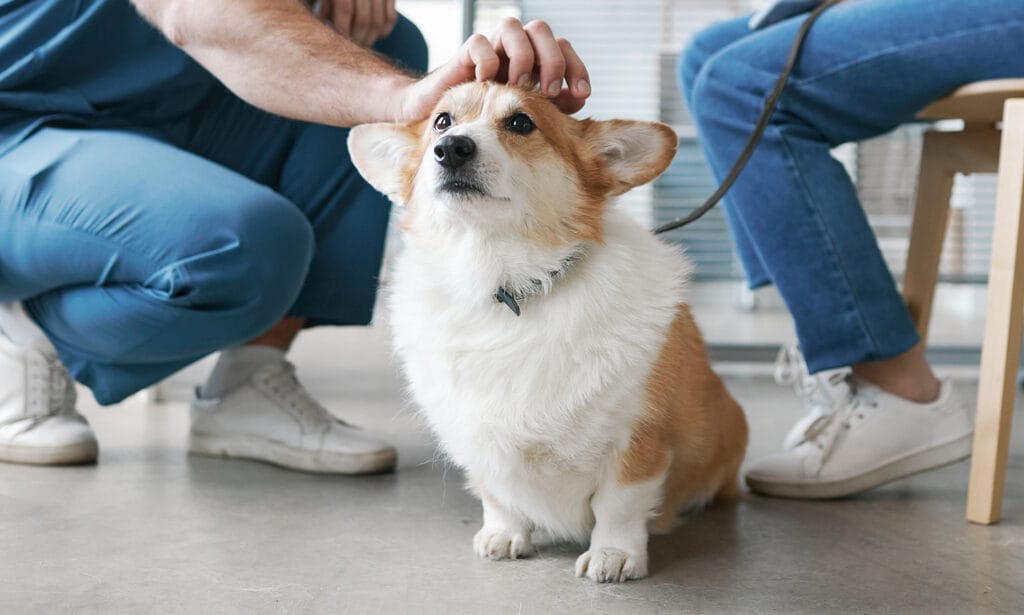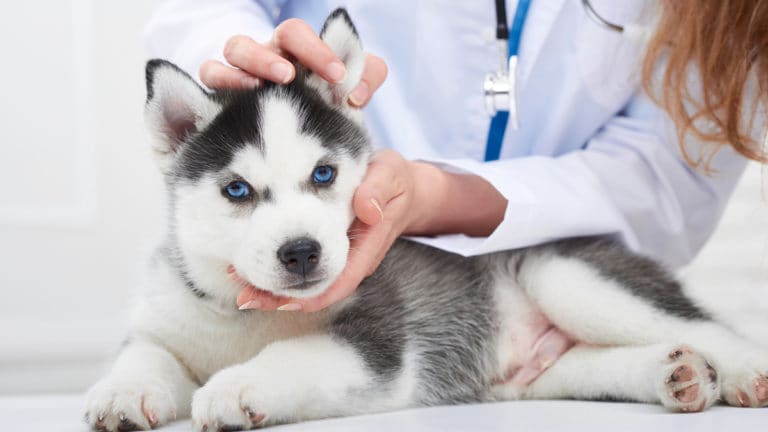Your dog’s poop color can tell you a lot about your pup’s health. Bright red or black, tarry-looking stool is a sign that your dog is pooping blood and may need immediate veterinary care.
While blood in dog stool isn’t always an emergency, it’s best to make an appointment with your vet ASAP so they can assess your dog’s condition to determine the cause or underlying issue.
That said, we talked to two veterinarians to uncover the most common causes and what you should do if you come across bloody stools.
In This Guide:
What Does Blood in Dog Poop Look Like?
Sometimes blood in dog poop is obvious, but other times it may not be. It depends on where the blood is coming from.
Bright Red Blood (Hematochezia)
In some cases, you might see bright red blood that looks like streaks or clots mixed with the stool. This is called hematochezia, and typically has a “fresher” look, like it’s more recent—because it is, according to Bethany Hsia, DVM, mobile veterinarian and co-founder of CodaPet, in Clovis, California.
Bright red blood usually indicates bleeding in the lower digestive tract, like the colon or rectum.
Black, Tarry Stool (Melena)
Black, tarry stool, also called melena, is a sign of blood that’s already digested. This stool is dark (almost black), sticky, and might resemble coffee grinds.
Melena typically comes from the upper digestive tract, like the stomach or small intestine.
Why Is My Dog Pooping Blood?
There are many possible causes for blood in your dog’s stool, and the type of blood-hematochezia versus melena can give clues about the causes, but it’s important to check with your veterinarian to rule out anything serious.
Here are some of the most common causes of each type of bloody stool, according to Dr. Hsia and Stacie Atria, DVM, holistic veterinarian and founder of Lotus Veterinary Alternatives in Alachua, Florida.
Hematochezia (Bright Red Blood)
- Colitis (inflammation of the colon): This can be caused by stress, inflammatory bowel disease, and/or food allergies.
- Infections: These can be viral (parvovirus), bacterial (salmonella, clostridium) and/or parasitic (hookworms, whipworms, coccidia, giardia).
- Tumors or polyps: Growths in the lower part of the digestive tract, like the colon or rectum, can get irritated and bleed.
- Trauma: Constipation and straining to poop can irritate the rectum. And when dogs strain to have a bowel movement, there can be blood in the stool.
- Acute hemorrhagic diarrhea syndrome (AHDS): Also known as hemorrhagic gastroenteritis (HGE), AHDS is one of the most serious causes of diarrhea in dogs and is considered a medical emergency.
- Clotting disorders: Clotting disorders, including toxins (rodenticide poisoning) and diseases of the kidneys, liver, and immune system, could cause bloody dog poop.
Melena (Dark, Tarry Stools)
Typically, the causes of melena, or black, tarry stools, are from issues with the upper digestive tract.
If you notice these changes in your dog’s stool, seek prompt treatment. The sooner you address the underlying cause, the better.
Common causes of dark, tarry stools include the following:
- Gastrointestinal ulcers: Ulcers in the small intestine and/or stomach can cause bleeding, and as the blood passes through the digestive tract, it turns black and tarry.
- Medications: Some medications, like steroids or non-steroidal anti-inflammatory drugs (NSAIDs), can cause blood in the stool as a side effect.
- Severe infections: Systemic infections, like parvovirus, can cause widespread internal bleeding.
- Pancreatitis: In severe cases, pancreatitis can cause bloody stool and vomiting.
- Ingested blood: Sometimes blood that’s digested because of injuries in the mouth or throat can eventually come out in the stool.
- Bleeding disorders: Uncontrolled bleeding, due to health conditions like thrombocytopenia or clotting disorders, may be the underlying cause.
- Acute trauma: Major trauma, like getting hit by a car, can cause bleeding in the GI tract that comes out in your dog’s poop.
Other common causes of dark, tarry stools include intestinal parasites, cancer, inflammatory bowel disease, and liver and kidney failure.
What Do I Do if My Dog Is Pooping Blood?
When in doubt, don’t wait. If your dog is pooping blood, Dr. Hsia says you should call your vet immediately for guidance.
Seek emergency veterinary care if your dog is vomiting, depressed, and/or passing large amounts of blood—as these can also be symptoms of something more serious. Your dog can also quickly get dehydrated.
Whatever you do, don’t try to treat things at home. It’s important to determine the underlying cause so you can figure out the appropriate next steps.
How Do Vets Treat Bloody Dog Poop?
Treatment depends on the cause, but there are a series of steps most vets will take to uncover that cause.
- First, your veterinarian will take a history to see if there have been any changes to your dog’s diet, changes to medicines and/or supplements, exposure to toxins, or any dietary indiscretion.
- Your vet will then recommend diagnostic testing that may include a fecal exam, blood testing, and/or imaging, like X-rays or an ultrasound.
- Depending on what your vet finds, the next step may be additional tests, like an endoscopy, to look for ulcers, tumors, or other physical obstructions.
Treatment will depend on the underlying cause, and this might involve:
- Dewormers for intestinal parasites
- A bland diet, probiotics/prebiotics
- Antibiotics
- Antacids
- Medication to help with vomiting
If your dog is dehydrated, fluid therapy, either given under the skin or intravenously, will be recommended. In severe cases, like ingestion of a foreign body or a tumor, surgery may be needed.
How Do I Prevent Bloody Stools in Dogs?
You may not be able to completely prevent your dog from pooping blood. But there are a number of things you can do to keep your dog as healthy as possible and reduce the risks.
- Keep up with preventive care. Be proactive with your dog’s health by getting regular checkups and making sure their vaccinations are up-to-date. Additionally, give your dog year-round heartworm medication that also offers protection against intestinal parasites, fleas, and ticks. Your vet will recommend the best medication for your pet.
- Minimize exposure to harmful substances. Atria says it’s also important to minimize exposure to harmful substances, like cleaning supplies, rodenticides, and trash. Rodenticide exposure needs to be treated as soon as possible and can be fatal with delayed and/or improper treatment. It’s also worth noting that if your dog gets into something they’re not supposed to, like discarded bones or fruit pits, it can make a blockage more likely.
- Provide the proper nutrition. You’ll also want to make sure you’re feeding your dog a healthy, balanced diet. If you notice your dog seems constipated or is struggling to pass stool, talk to your veterinarian to see if they recommend adding a fiber supplement (like Vetnique Labs® Glandex®), increasing water consumption, or changing to a high-fiber diet (like Hills® Prescription Diet® w/d Multi-Benefit). It’s important to also rule out any underlying causes, like arthritis, that could make it more difficult for your dog to have bowel movements.
- Consider probiotics/prebiotics. Consult your veterinarian about adding probiotics/prebiotics (like Nutramax® Proviable®) to help support your dog’s gut health. Consider exercising your dog more with longer or more frequent walks to help get their digestive tract moving.
FAQs About Dogs Pooping Blood
Q:Is a dog pooping blood an emergency? Should you head to an emergency vet?
A:Dr. Atria says a vet visit is always essential if your dog is pooping blood, but whether it’s an emergency depends on what it looks like and if there are other signs accompanying it.
Black, tarry stools or liquid blood with minimal stool (which indicates heavy bleeding) require urgent veterinary attention. If your dog is lethargic or vomiting, not eating or drinking, or has pale gums, you’ll also want to head to the emergency vet ASAP.
Q:Why is my dog pooping blood but acting fine?
A:It could be because the cause of the bloody stool isn’t serious or the situation hasn’t progressed to something more serious yet. Don’t assume your dog is OK just because they’re acting fine. Even if your dog doesn’t have other symptoms, you still want to check in with your vet.
Q:What should I do if my dog poops liquid blood?
A:If your dog is pooping liquid blood, head to the emergency vet. Liquid blood with minimal stool indicates heavy bleeding and can be life-threatening if left untreated.
Q:What is my dog's poop like jelly with blood?
A:Jelly-like, bloody poop is often a sign of AHDS, which is considered a medical emergency. Typically, AHDS comes on suddenly and is accompanied by other signs, like decreased appetite, lethargy, and fever. AHDS can affect any breed but is most common in small dogs such as Poodles, Dachshunds, and Yorkshire Terriers.
Q:What should I do if my dog has bloody diarrhea?
A:If your dog has bloody diarrhea, call your vet or your local emergency clinic for guidance on what to do next. They may recommend taking your dog in immediately, especially if there are other signs of illness.
Dr. Hsia says bloody diarrhea in dogs is generally more concerning than solid stool with blood, as it indicates active bleeding. It can be a sign of severe inflammation or infection, and can lead to rapid dehydration.
When in doubt, don’t wait. It’s better to get prompt treatment even if the cause doesn’t end up being something serious.
Discovering blood in your dog’s stool can be alarming, but the causes can range from something as simple as dietary indiscretions or constipation to intestinal parasites or tumors. Responding quickly and getting the proper veterinary care is vital for your dog’s health. If you notice blood in your dog’s poop, get a stool sample and head to your vet ASAP. Don't have a vet? Here's how to find one.
Expert insight provided by Stacie Atria, DVM, holistic veterinarian and founder of Lotus Veterinary Alternatives in Alachua, Florida; and Bethany Hsia, DVM, mobile veterinarian and co-founder of CodaPet, in Clovis, California.
This content was medically reviewed by Chewy vets.
Share:









